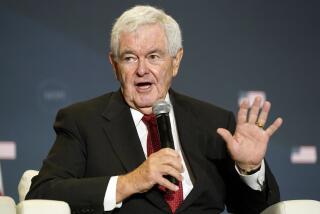Movement to Kill Campaign Finance Reform Falters
WASHINGTON — Only a few weeks ago, advocates of campaign finance reform had good reason to feel dejected--their agenda was stalled in Congress and the public seemed utterly apathetic. Suddenly, however, the dynamics have begun to shift and the special interest-fueled drive to squelch reform is no longer the slam-dunk it seemed.
The bid to change campaign finance laws, to be sure, has yet to develop critical momentum. But recent events on Capitol Hill--most notably an insurrection by more than half a dozen GOP senators during a private lunch--have given the push for reforms a much-needed boost.
Hoping to capitalize on the surprising turn of events, symbolism-minded reformers today are to open a new phase of their effort, one designed to involve the public. A noontime rally in support of the reform effort is scheduled at Boston’s historic Faneuil Hall, to be followed by a rally Wednesday at Philadelphia’s Independence Hall near the Liberty Bell.
“Our challenge is to make the connection between cleaning up these campaigns--and the way they’re financed--and the ability of American parents to educate their kids or provide better lives,” said Sen. John McCain (R-Ariz.), a chief proponent of campaign finance reform.
“These public events will be helpful--and just at the right time,” added Sen. Russell D. Feingold (D-Wis.), McCain’s main collaborator.
The recent fast-moving events provide an illuminating glimpse of how the dynamics of a volatile debate can abruptly change--and lead to outcomes that few can foresee.
“The nervousness level is way up,” McCain said, assessing the mood of his colleagues on the Hill.
“Things now could move quickly all of a sudden,” said Feingold. “The dam could break” in terms of a public clamor developing for reform.
Feingold added: “And once you see this happening, and I think it is happening, political people usually like to have things like that to be over--fast.”
Many reform proponents puzzled over the apparent absence of public clamor for a change in the rules of the political money game, especially in light of the continuing revelations of questionable campaign fund-raising tactics by members of both parties. But some contended that a broad sentiment for reform lurks just below the surface.
“As I’ve visited around and visited around on college campuses, there isn’t much [talk]--until you start asking about it,” said retired Sen. Nancy Kassebaum-Baker (R-Kan.), who has teamed up with former Vice President Walter F. Mondale in a White House-backed drive to generate public support for reform.
*
Mondale, appearing Sunday on NBC-TV’s Meet the Press, predicted: “As this discussion goes forward, the American people are going to begin to demand change.”
If, then, Congress were to enact sweeping reforms this year, historians may well identify the weekly luncheon of the Senate’s 55 Republicans on March 11 as a pivotal moment.
Even before all the club sandwiches and chips had been wolfed down in an elegant Capitol meeting room, Sen. Trent Lott (R-Miss.), the normally ebullient and strong-minded majority leader, had been forced on the defensive by a small group of senators.
At issue was the scope of the Senate’s investigation of campaign fund-raising abuses. Until then, Lott and his GOP majority had seemed certain to limit the inquiry to charges of outright violations of federal law. That would have focused the investigation on Democratic missteps--only President Clinton’s reelection campaign had been accused of actual violations--and thus ignored potential ethical lapses by Republicans as they fought to retain their majorities in Congress.
Behind closed doors, however, more than half a dozen GOP senators rose, one by one, to oppose Lott’s plan.
“There were a number of us that were very concerned about . . . the realities of circumscribing [the investigation]. . . . Some of us view the role of Congress not to just expose illegal activities but also improper,” McCain said. “And second of all, we were worried about the impression that this would create among the American people that we were basically engaged in some kind of cover-up.”
Faced with certain defeat, Lott abruptly reversed course and agreed to expand the investigation to improper as well as illegal campaign practices.
That is a noteworthy distinction and not only because it could put some Republicans in the investigation’s spotlight. More than that, revelations of unseemly fund-raising tactics by both parties could add to public pressure for reform, an outcome dreaded by most incumbents.
“It was one of those rare times in the Senate where there was a debate which basically brought about a change in position,” McCain said, marveling at the turn of events.
Among the other GOP senators who argued for a broader inquiry were Arlen Specter of Pennsylvania, a onetime prosecutor with an independent streak; Susan Collins of Maine, a newcomer who had defeated two millionaires in her GOP primary; Sam Brownback of Kansas, a freshman with populist leanings; and Dan Coats of Indiana, a prairie conservative who is retiring at the end of his term. Even two highly partisan longtimers, Pete V. Domenici of New Mexico and Ted Stevens of Alaska, chimed in.
“I think you see potential co-sponsors of our bill coming from that group,” said Feingold.
So far, the only Republican senator to sign up as a co-sponsor is Fred Thompson of Tennessee, who will lead the Senate’s investigation as chairman of the Governmental Affairs Committee. The panel’s public hearings are likely to begin in late spring or early summer.
Meanwhile, with little notice, more than half of the 45 Senate Democrats already have signed up as co-sponsors.
More to Read
Get the L.A. Times Politics newsletter
Deeply reported insights into legislation, politics and policy from Sacramento, Washington and beyond. In your inbox three times per week.
You may occasionally receive promotional content from the Los Angeles Times.










